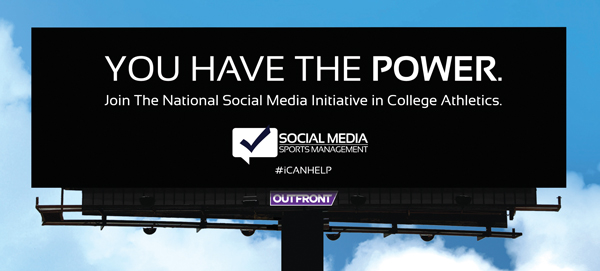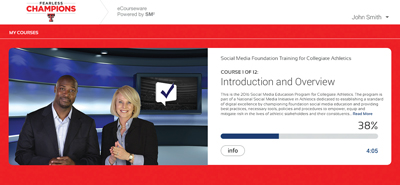College athletes are college athletes, whether they’re performing at powerhouse Auburn University or tiny Limestone College. They’re going to be on social media, they’re going to make mistakes in judgment, and without some sort of training, they could put the university’s brand at risk.
That doesn’t change no matter how big the stadium is, or how many people are watching on TV.
But paying for social media training and education for their athletes can strain budgets at mid-majors and smaller schools, which obviously can’t stroke a check like the Auburns of the college world.
So, a firm that specializes in social media training and education is trying to create a way to provide its curriculum
 |
A series of public service announcements, including billboard ads, tout the initiative.
|
to those schools at a reduced cost.
“Schools with no money still need this foundational education,” said Carrie Cecil, CEO of Social Media Sports Management, which goes by SM2.
Cecil’s social media training firm, which launched a year ago, has partnered with a pair of nonprofit organizations — #iCANHELP and the Net Safety Collaborative — to forge an educational program for small athletic departments that face budget constraints.
The three groups involved in this alliance are still working on exactly how to apply a discounted or free program, but mostly those schools in the lower reaches of Division I, as well as those in Division II and III, might expect some financial relief on implementing the cloud-based training program.
“This is a philanthropic partnership that will fund education, assistance and solutions to athletic departments with budget challenges,” Cecil said. “It’s important to have this type of education available, but the question is how do you cover the costs for the schools that can’t afford it?”
While she has found a solid base of clients within the power five conferences, including Auburn, TCU and Texas Tech, Cecil believes the need for social media education is just as strong across the lower divisions.
But with an annual price tag that ranges from the low-to-mid five figures, SM2’s services are an expense that many smaller athletic departments can’t afford.
Under this philanthropic initiative, the costs to run SM2’s program at the smaller schools will be covered by a combination of donations, sponsorships and grants. Donations could come from individuals, families or foundations, but Cecil said her group will not solicit donations from university donors.
SM2 also will be selective about the types of companies that might want to sponsor a program. Using the most extreme example, SM2 wouldn’t seek a sponsorship from a beer maker, but would gladly work with a platform like Twitter on a social media responsibility campaign.
 |
| The costs to provide the training to smaller schools would be covered by donations, sponsorships and grants. |
Cecil’s company also has hired an attorney experienced in the nonprofit world to help apply for grants. Eventually, this educational effort could lead to a nonprofit arm of SM2.
“In some cases, there might be some money available through a conference,” said Cecil, who has worked with the Big 12 and the Summit League to present her curriculum on social media risks and best practices. “We’ll look for ways to subsidize this any way we can. That’s how important it is to have this kind of education available.”
Cecil, who has been working to formulate the curriculum for nearly three years, launched a beta test with select schools last year, including Division II Limestone College in South Carolina.
The educational tool, which can be accessed by any internet-ready device, instructs coaches, athletes and staff on the pitfalls of social media, and offers training in how to mitigate risk while still maintaining a presence. Because of the cloud-based platform, the curriculum can be updated or enhanced at any time.
Western Illinois, a Division I mid-major from the Summit League, is one of those schools that has expressed interest in SM2’s program but would be challenged to pay for it at full cost.
“We’re in the early stages of working with Carrie, but she really wants to make this accessible to mid-majors,” said Matt Tanney, athletic director at Western Illinois. “We’re not Oklahoma or Ohio State — certainly they have different issues than we do — but some of our issues are not that different. Our student athletes and our staff still need this kind of education.
“Things that happen at Western Illinois don’t make as big a splash, but they still have legal components, HR components, compliance components. I think Carrie’s program can make a difference no matter what division you’re in.”
Tanney then took Cecil’s program to the Summit League, where ADs and senior women’s administrators at the league meetings last week heard her pitch on the need for training.
“Social media is something 10 years ago we didn’t even talk about,” Summit League Commissioner Tom Douple said. “Our ADs need to be educated, our student athletes need to be educated, and I need to be educated.”
This week, Cecil will be one of the featured presenters at the National Association of Collegiate Directors of Athletics’ annual convention in Dallas. Cecil said she’ll focus on cases where social media has been misused, how to create a foundational education for schools, what to do when a crisis arises, and brand management through the many social media platforms.
SM2 also is collaborating with other social media experts and foundations to start the National Social Media Initiative in Athletics, a resource that will share best practices on social media.
Around this, SM2 is launching a series of public service announcements called “You Have the Power” on billboards, print and digital media, and regional sports networks. SM2’s own in-house production team produced the spots.
“We all took driver’s ed before we started driving,” Cecil said. “But no one before now taught social media ed before we started using social media.”





